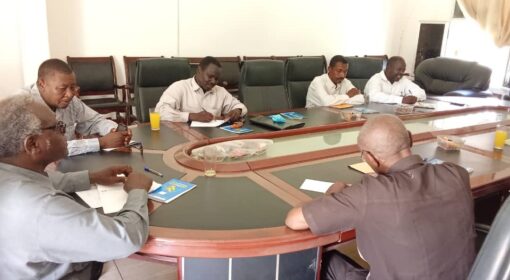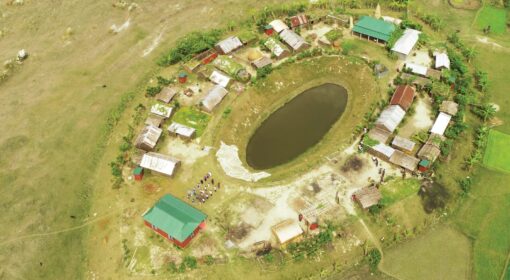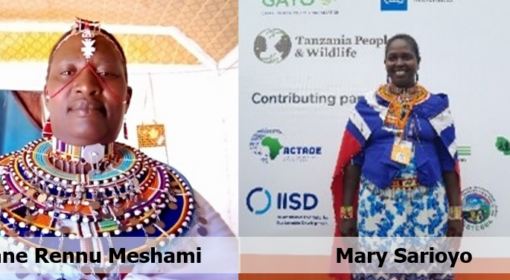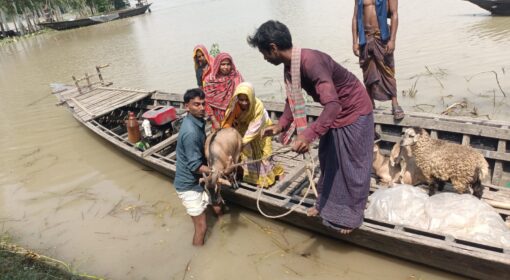This blog is part of a dossier on locally-led adaptation, featuring insights and lessons from the Reversing the Flow (RtF) program. RtF empowers communities in Bangladesh, Burkina Faso, Ethiopia, Kenya, and Sudan to build climate resilience through direct funding and a community-driven, landscape approach.
Meet these 4 individuals from UTTARANs LANDWATER project area. They present their challenges, their aspirations and what this RtF project means to them. These stories reflect the hardships experienced by the affected individuals and families.
At the same time, UTTARAN takes pride in standing by them and providing much-needed assistance through the LANDWATER initiative. It is heartening to see the positive impact of our efforts, even in the face of such adversity, as we continue working towards sustainable solutions for these communities.
Shona Van’s Struggle for Survival in Isolation and Adversity
Landscape Name: Jugipota, Satkhira Sadar
Shona Van, a 50-year-old widow, has spent the past 15 years navigating a life of relentless hardship and resilience. Her world was upended by the loss of her husband, leaving her to face profound loneliness and the burden of survival alone. Adding to her challenges, her only son, now living in India with his family, has neither visited nor communicated with her in five years. With no emotional or financial support, Shona has relied entirely on her own strength to endure.
Shona works tirelessly in fields and fish farms, her labor as relentless as the challenges she endures. This year, heavy waterlogging devastated her rice crops, cutting off her primary source of income and food, while her modest home remained submerged for 40 days, turning daily life into a battle against despair. Climate change has worsened the hardships for Shona and her community, with erratic weather, rising salinity, and prolonged flooding rendering farming and aquaculture increasingly unreliable, pushing livelihoods to the brink and leaving basic necessities out of reach. Amid this adversity, some hope has emerged as Shona recently known about an initiative led by RVO-Rtf in partnership with Uttaran, aimed at rehabilitating disaster-prone landscapes and empowering communities like hers through sustainable livelihoods and resilience-building programs. For the first time in years, Shona feels a sense of optimism. This initiative, addressing the systemic challenges her region faces, offers a chance to rebuild not just her livelihood but her dignity. She believes this effort could transform her life and those of her fellow villagers, restoring hope and stability to their fragile existence.
Shona’s story is a powerful testament to the resilience of the human spirit. It also highlights the urgent need for targeted support and systemic change in disaster-prone regions. Through collective effort and meaningful action, a brighter future is within reach for women like Shona, who have borne the weight of survival for far too long.
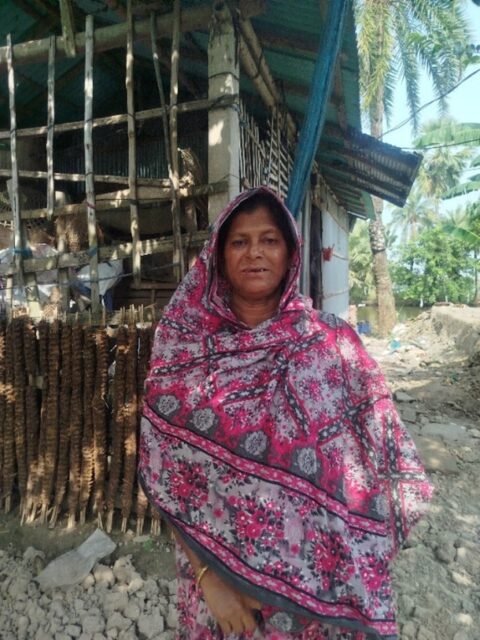
Rasida Khatun’s Struggle with Economic and Infrastructure Challenges
Landscape Name: Hajrakhali, Assasuni
Rasida Khatun, a 41-year-old day laborer, lives with her husband and young daughter in a remote area that was severely affected by the Amphan cyclone. Their family faces constant challenges, with limited job opportunities and inadequate infrastructure exacerbating their difficulties. Rasida and her husband work as day laborers, but they can only find employment for five months each year, leaving them struggling with unemployment for the remainder of the year. This uncertainty makes it difficult to meet their basic needs and support their daughter, creating a cycle of economic instability.
The situation grew even worse after the Amphan cyclone, which cut off their area from the mainland, isolating them from essential resources and services. The only access to the outside world is a fragile drum-and-bamboo bridge, which is both unsafe and in desperate need of repair. One day, while crossing this precarious bridge, Rasida’s right leg was severely injured when it got trapped in the bamboo sticks. She fainted from the excruciating pain and was rescued by members of her community. The injury left her unable to work for three months, with her leg in a cast, during which time her husband bore the full responsibility of providing for their household.
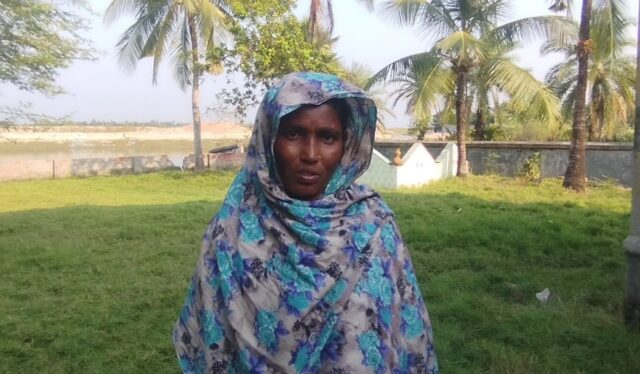
This period of hardship underscored the vulnerability of Rasida’s family, as they lacked a safety net or alternative sources of income, leaving them highly exposed to the economic and environmental shocks that often affect their community. Rasida’s story highlights the interconnectedness of inadequate infrastructure, economic hardship, and environmental challenges, which together compound the struggles of families living in disaster-prone areas.
After an initiative led by RVO-Rtf in partnership with Uttaran aims to address these systemic issues and improve the lives of families like Rasida’s. This initiative emphases on rehabilitating disaster-prone landscapes and empowering communities to ensure long-term resilience. By meeting immediate needs, like medical care and financial assistance, alongside investments in sustainable infrastructure, this initiative holds the potential to transform the lives of vulnerable families, providing them with the tools and resources to withstand future challenges and build a more secure and dignified life.
Hashem Gazi’s Struggle with Disability and Disaster Vulnerability
Landscape Name: Soladana, Khulna
Hashem Gazi, a 75-year-old blind man, lives in a riverside lowland community that is frequently hit by natural disasters such as storm surges and cyclones, which occur 2 to 3 times annually. His blindness and frailty make him entirely dependent on others for mobility and daily tasks, and during disasters, this dependency becomes even more pronounced. When disaster strikes, Hashem is left vulnerable, relying on neighbors or family members to help him navigate the chaos, yet they too are already struggling to survive the extreme conditions. The physical and emotional toll on those around him during these emergencies creates additional challenges for Hashem, who is unable to act independently in times of crisis.

Residing in a low-lying area by the river, Hashem’s community regularly faces storm surges, cyclones, and prolonged waterlogging, which destroy homes, disrupt livelihoods, and pose grave risks to everyone. However, for individuals like Hashem, these events are particularly hazardous. His inability to evacuate or seek shelter on his own further exacerbates his vulnerability, and the lack of accessible evacuation plans or shelters leaves him with limited options during a disaster. The community, already overwhelmed by the dangers and aftermath of such events, often cannot prioritize the specific needs of individuals like Hashem.
Hashem’s story highlights the critical risks faced by individuals with disabilities, especially in disaster-prone regions where the environment compounds their vulnerability. While his blindness and physical weakness make him reliant on others, there is hope for improving his situation. Through initiatives like those led by RVO-Rtf in partnership with Uttaran, a more inclusive approach to disaster preparedness can be developed. By implementing targeted support for individuals with disabilities and ensuring that disaster response strategies are accessible to all, Hashem and others in similar situations can be better equipped to face future disasters with greater dignity, independence, and resilience. This approach promotes a safer, more inclusive community where every individual’s needs are addressed, ensuring that no one is left behind in times of crisis.
Laily’s Struggle for Survival
Landscape Name: Godai Beel, Satkhira Sadar
Laily, a 60-year-old widow, has endured a life shaped by hardship and isolation since the death of her husband a decade ago. Despite having two sons, they have chosen to live independently with their families, offering her no emotional or financial support. Left to fend for herself, Laily works as a domestic helper to make ends meet, but her declining health and dire living conditions have turned everyday survival into a relentless struggle.
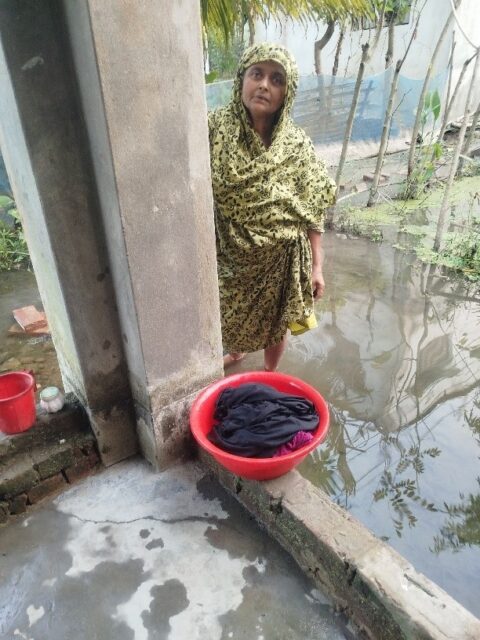
Over the years, Laily’s health has significantly deteriorated. She has suffered two strokes and continues to battle liver stones, which require consistent medication and medical care. These expenses force her to keep working despite her fragile condition, compounding her physical and emotional strain. Her challenges are further exacerbated by the inadequate infrastructure surrounding her home. Persistent waterlogging leaves her house flooded, making even the simplest tasks, like commuting to work, exhausting and hazardous. The lack of clean water sources in her community forces her to rely on polluted water, worsening her health issues and leaving her further vulnerable.
Laily’s story reflects a broader crisis of neglect, both societal and systemic, faced by vulnerable groups, especially elderly women in rural or underserved areas. The absence of support from her family leaves her emotionally and financially isolated, while poor infrastructure, environmental degradation, and the lack of basic amenities deepen her struggles.
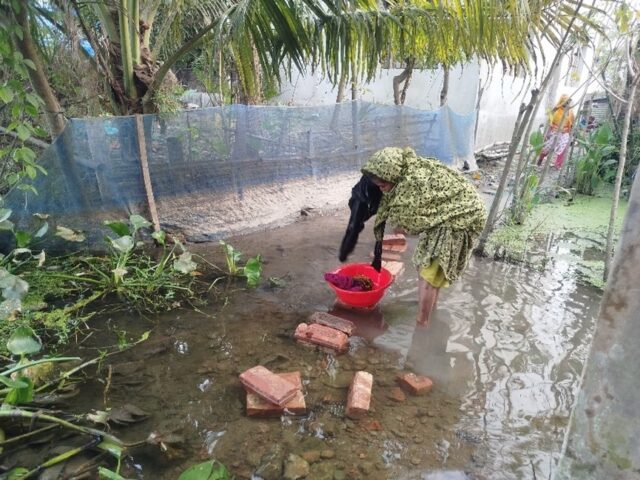
However, a glimmer of hope has emerged through an initiative led by RVO-Rtf in partnership with Uttaran, designed to address these systemic issues in disaster-prone areas. The program aims to empower vulnerable communities like Laily’s by improving infrastructure, addressing environmental challenges, and promoting sustainable livelihoods. This initiative provides a path toward a more dignified life for individuals like Laily, offering not only solutions to immediate problems but also hope for a future where basic needs are met and systemic neglect is replaced with collective support and resilience-building efforts.
